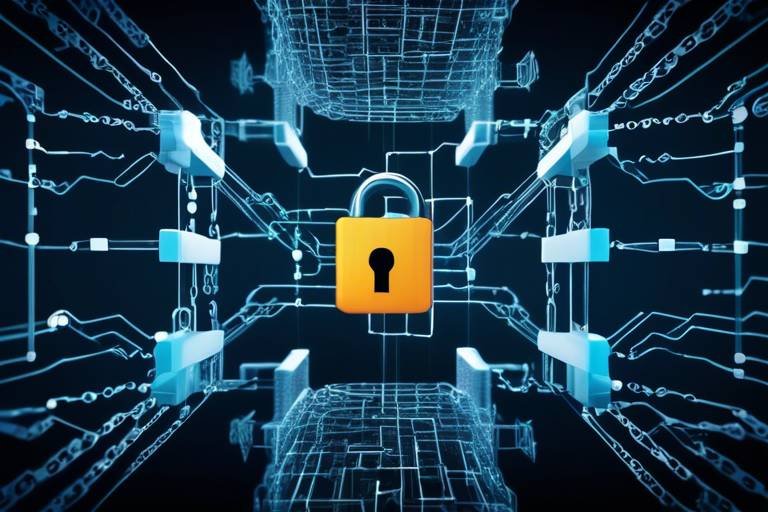How Blockchain Technology is Transforming the Legal Industry
In recent years, the legal industry has been on the brink of a technological revolution, and at the heart of this transformation is blockchain technology. Imagine a world where legal processes are not only faster but also more secure and transparent. Sounds like a dream, right? Well, it's becoming a reality as blockchain begins to reshape how legal professionals operate. With its ability to provide a decentralized platform that ensures data integrity, blockchain is paving the way for a more efficient legal landscape. This article explores the revolutionary impact of blockchain technology on the legal sector, highlighting its potential to enhance transparency, efficiency, and security in legal processes and transactions.
To fully appreciate how blockchain can revolutionize the legal industry, it's essential to understand its core principles. At its heart, blockchain is a decentralized ledger that records transactions across multiple computers. This means that no single entity has control over the entire database, making it resistant to tampering and fraud. The key concepts of decentralization, immutability, and smart contracts are fundamental to grasping the implications of blockchain in law. Decentralization eliminates the need for intermediaries, while immutability ensures that once data is recorded, it cannot be altered. Smart contracts, on the other hand, are self-executing contracts with the terms directly written into code, automating processes and reducing the potential for disputes.
One of the most significant areas where blockchain shines is in contract management. Traditional contract management can be cumbersome and prone to errors, leading to disputes and delays. With blockchain, we can automate many of these processes through smart contracts, which execute automatically when predetermined conditions are met. This not only improves efficiency but also reduces the likelihood of misunderstandings between parties. Imagine a scenario where a contract for a real estate transaction is automatically executed once the payment is made—no more waiting for checks to clear or paperwork to be processed!
So, what exactly are smart contracts? Think of them as digital facilitators of agreements that live on the blockchain. They are programmed to execute specific actions when certain conditions are met. For instance, in a freelance agreement, a smart contract could automatically release payment to the freelancer once they submit their work and the client approves it. This not only ensures that both parties fulfill their obligations but also minimizes the need for intermediaries, such as lawyers or escrow services. The beauty of smart contracts lies in their ability to streamline transactions and enhance trust between parties.
The benefits of smart contracts are numerous and impactful. Here are a few key advantages:
- Speed: Transactions are executed almost instantly, eliminating delays associated with traditional processes.
- Cost-Effectiveness: By reducing the need for intermediaries, parties can save on legal fees and administrative costs.
- Accuracy: Automated execution minimizes human error, ensuring that contracts are carried out as intended.
- Transparency: All parties involved can view the contract terms and execution status, fostering trust.
Despite their many advantages, smart contracts are not without challenges. Legal recognition is a significant hurdle; many jurisdictions are still grappling with how to classify and enforce these digital agreements. Additionally, the technical complexities of creating and managing smart contracts can be daunting for those unfamiliar with blockchain technology. These challenges need to be addressed for smart contracts to reach their full potential in the legal sector.
Another area where blockchain can make a substantial impact is in evidence management. In legal cases, the integrity and accessibility of evidence are crucial. Blockchain technology can provide a tamper-proof record of evidence, ensuring that it remains secure and unaltered throughout the legal process. This means that once evidence is uploaded to the blockchain, it cannot be changed or deleted, providing a clear chain of custody. Imagine a courtroom where every piece of evidence is verifiable and trustworthy—this is the future that blockchain promises.
The transparency inherent in blockchain technology can significantly enhance trust among stakeholders in the legal field. By providing a clear and immutable record of transactions, blockchain can reduce instances of fraud and malpractice. When clients know that their legal documents and contracts are secure and verifiable, they are more likely to engage with legal services. This increased transparency can foster a more trusting relationship between clients and legal professionals, ultimately benefiting the entire industry.
Real-world applications of blockchain technology in legal scenarios illustrate its transformative effects. For instance, in some jurisdictions, blockchain is being used to manage property titles, ensuring that ownership records are accurate and easily accessible. Another case study involves the use of blockchain for intellectual property rights, where artists can register their works on a blockchain to establish ownership and prevent unauthorized use. These examples highlight how blockchain is not just a theoretical concept but a practical tool that can reshape the legal landscape.
Looking ahead, the future of blockchain technology in the legal industry appears promising. As more legal professionals become familiar with the technology, we can expect to see advancements in areas such as dispute resolution, compliance, and regulatory frameworks. The evolution of legal practices will likely be driven by the need for greater efficiency and transparency, making blockchain an essential component of the modern legal toolkit.
- What is blockchain technology? Blockchain is a decentralized digital ledger that records transactions across multiple computers, ensuring security and transparency.
- How do smart contracts work? Smart contracts are self-executing agreements with the terms directly written into code, automating processes and reducing disputes.
- What are the benefits of using blockchain in law? Benefits include increased efficiency, reduced costs, enhanced security, and improved transparency in legal processes.
- What challenges does blockchain face in the legal industry? Challenges include legal recognition, technical complexities, and the need for regulatory frameworks.

The Basics of Blockchain Technology
Understanding blockchain technology is crucial to grasp its implications for the legal industry. At its core, blockchain is a distributed ledger technology that allows multiple parties to maintain a single, unchangeable record of transactions. Imagine a digital notebook that everyone can see and write in, but once something is written, it cannot be erased or altered. This concept of decentralization ensures that no single entity has control over the entire system, which is a game-changer for industries that rely on trust and verification.
One of the most fascinating features of blockchain is its immutability. Once information is recorded on the blockchain, it becomes nearly impossible to change. This characteristic is paramount in legal contexts, where the integrity of data is essential. Think of it like a sealed vault; once the documents are locked inside, no one can tamper with them without leaving a trace. This not only enhances security but also fosters a sense of trust among parties involved in legal transactions.
Another exciting aspect of blockchain is the concept of smart contracts. These are self-executing contracts where the terms are written directly into code. Instead of relying on traditional legal processes, smart contracts automatically execute actions when predetermined conditions are met. For instance, imagine a rental agreement where the payment is automatically deducted from the tenant's account once they move in. This automation significantly reduces the chances of disputes and misunderstandings, making the legal process more efficient.
To put it simply, blockchain technology offers a framework that enhances transparency, security, and efficiency in legal processes. Here’s a quick summary of the fundamental principles:
- Decentralization: No single authority controls the blockchain.
- Immutability: Once recorded, data cannot be changed.
- Smart Contracts: Automated agreements that execute actions based on conditions.
As we delve deeper into how blockchain can transform the legal industry, it's essential to appreciate these foundational elements. They set the stage for understanding the profound changes that blockchain can bring about, from improving contract management to enhancing evidence management. With these principles in mind, let’s explore how blockchain technology is reshaping the legal landscape.

Enhancing Contract Management
In the fast-paced world of legal transactions, managing contracts efficiently is crucial. Traditional methods often involve cumbersome paperwork, prolonged negotiations, and a multitude of intermediaries, which can lead to delays and disputes. Enter blockchain technology. This innovative solution is revolutionizing contract management by introducing a level of automation and transparency that was previously unimaginable. By utilizing smart contracts, legal professionals can streamline their processes and focus on what truly matters: delivering justice and value to their clients.
So, what exactly are smart contracts? Think of them as digital agreements that automatically execute actions when predefined conditions are met. This means that once a contract is agreed upon and coded into the blockchain, it can operate independently, eliminating the need for constant oversight. Imagine a vending machine: you insert your money, select your item, and the machine automatically delivers it without needing a cashier. Similarly, smart contracts function in a self-sufficient manner, ensuring that all parties adhere to the terms without requiring constant intervention.
One of the most significant advantages of using blockchain for contract management is the reduction of disputes. With traditional contracts, ambiguities and misinterpretations can lead to disagreements. However, smart contracts are coded with clear, unambiguous terms that are visible to all parties involved. This transparency not only fosters trust but also minimizes the likelihood of conflicts arising from miscommunication. As a result, legal professionals can save time and resources that would otherwise be spent on resolving disputes.
Moreover, the automation of contract management through blockchain can lead to significant cost savings. By reducing the need for intermediaries, such as lawyers or notaries, clients can enjoy faster and more affordable legal services. For instance, in a typical real estate transaction, numerous parties are involved, each taking a cut of the fees. With blockchain, the process can be simplified, allowing for direct transactions between buyers and sellers. This not only accelerates the process but also ensures that all parties are fairly compensated without unnecessary overhead costs.
However, it's important to acknowledge that the implementation of smart contracts is not without its challenges. Legal recognition of these contracts varies across jurisdictions, and there is still a degree of uncertainty regarding their enforceability in court. Additionally, the technical complexities involved in coding and deploying smart contracts can pose hurdles for legal professionals who may not be tech-savvy. Nevertheless, as the legal industry continues to adapt to technological advancements, these challenges are likely to be addressed, paving the way for a more efficient future.
In conclusion, blockchain technology is set to transform contract management in the legal industry. By leveraging smart contracts, legal professionals can enhance efficiency, reduce disputes, and lower costs. As we move forward, it's essential for stakeholders to stay informed about these advancements and consider how they can integrate blockchain into their practices. The future of law is not just about keeping up; it's about embracing change and harnessing technology to create a better, more transparent legal landscape.
- What are smart contracts? Smart contracts are self-executing agreements with the terms written into code, allowing for automated execution without the need for intermediaries.
- How does blockchain improve contract management? Blockchain enhances contract management by providing transparency, reducing disputes, and lowering costs through automation.
- What challenges exist with smart contracts? Challenges include legal recognition, technical complexities, and the need for widespread understanding among legal professionals.
- Can smart contracts be used in all legal jurisdictions? No, the legal recognition of smart contracts varies by jurisdiction, and their enforceability may be uncertain in some areas.

Smart Contracts Explained
Smart contracts are the **game-changers** of the blockchain world, revolutionizing how agreements are made and executed. Imagine a vending machine: you insert your money, select your snack, and voilà! The machine automatically delivers your choice without any human intervention. That’s essentially how smart contracts work. They are **self-executing agreements** with the terms of the contract directly written into lines of code. Once the conditions are met, the contract executes automatically, ensuring that all parties fulfill their obligations without the need for a middleman.
The brilliance of smart contracts lies in their **transparency** and **security**. Once a smart contract is deployed on the blockchain, it cannot be altered, which means that all parties can trust that the terms will be honored as agreed upon. This immutability is crucial in the legal industry, where disputes often arise over contract interpretations. With smart contracts, the code is the law, and everyone involved can see the exact terms and conditions, reducing the chances of misunderstandings.
Moreover, smart contracts can be programmed to handle complex agreements. For instance, in real estate transactions, a smart contract can manage multiple conditions such as the transfer of ownership, payment schedules, and even escrow services—all without the need for traditional paperwork. This not only saves time but also significantly reduces costs associated with legal fees and administrative overheads.
However, it’s essential to recognize that smart contracts are not without their challenges. For instance, while they automate execution, they still rely on the quality of the data fed into them. If the data is inaccurate or the conditions are poorly defined, the entire contract could fail to perform as intended. Additionally, the legal recognition of smart contracts remains a gray area in many jurisdictions, raising questions about enforceability in traditional courts.
In summary, smart contracts are a **powerful tool** that can enhance efficiency and reduce disputes in the legal sector. They streamline processes, eliminate unnecessary intermediaries, and provide a level of security and transparency that traditional contracts often lack. As the legal industry continues to embrace technological advancements, understanding and utilizing smart contracts will become increasingly vital for legal professionals.

Benefits of Smart Contracts
Smart contracts are revolutionizing the way legal agreements are executed and enforced. By leveraging the power of blockchain technology, these digital contracts offer a plethora of benefits that traditional contracts simply cannot match. Imagine a world where agreements are not only self-executing but also immune to tampering. This is the promise that smart contracts bring to the table.
One of the most significant advantages of smart contracts is their ability to streamline transactions. In traditional legal frameworks, executing a contract often involves multiple intermediaries, including lawyers, notaries, and banks. Each of these parties adds layers of complexity and cost to the process. Smart contracts eliminate the need for these intermediaries by automating the execution of agreements. For instance, consider a real estate transaction where a smart contract can automatically transfer ownership once payment is received, without the need for a third party to oversee the process.
Moreover, the transparency offered by smart contracts is unparalleled. Since they are stored on a blockchain, all parties involved can access the contract and its execution status at any time. This visibility significantly reduces the chances of disputes arising from misunderstandings or misinterpretations. In fact, the clarity provided by smart contracts can lead to a notable decrease in legal disputes, as all terms are clearly defined and agreed upon in advance.
Another compelling benefit is the cost-effectiveness of smart contracts. By reducing or even eliminating the need for intermediaries, the associated costs of legal transactions drop significantly. This not only makes legal services more affordable but also opens the door for small businesses and individuals to access legal agreements that were previously out of reach due to high costs. For example, startups can utilize smart contracts for funding agreements, ensuring that they only pay for what they need, when they need it.
Additionally, smart contracts enhance security in legal transactions. Once a contract is created and executed on the blockchain, it becomes immutable. This means that no one can alter the terms of the contract without the consensus of all parties involved. This feature is crucial in maintaining the integrity of legal agreements, as it protects against fraud and unauthorized changes. The use of cryptographic techniques further safeguards the data, ensuring that sensitive information remains confidential.
However, while the benefits of smart contracts are substantial, they are not without challenges. Legal recognition of these digital agreements is still a gray area in many jurisdictions. As the legal landscape evolves, it will be essential for lawmakers to catch up with technological advancements to ensure that smart contracts are recognized and enforceable in courts.
In summary, the benefits of smart contracts are numerous and transformative. They offer a more efficient, transparent, and secure way of managing legal agreements. As the legal industry continues to adapt to technological advancements, embracing smart contracts could very well be the key to unlocking a new era of legal practice.
- What are smart contracts? Smart contracts are self-executing contracts with the terms of the agreement directly written into code, which automatically enforce and execute the contract when conditions are met.
- How do smart contracts enhance security? Smart contracts are stored on a blockchain, making them immutable and resistant to tampering, which protects against fraud and unauthorized changes.
- Are smart contracts legally binding? The legal status of smart contracts varies by jurisdiction, and ongoing discussions aim to provide clarity on their enforceability in courts.
- Can smart contracts reduce costs? Yes, by minimizing the need for intermediaries, smart contracts can significantly lower the costs associated with legal transactions.

Challenges of Implementing Smart Contracts
While smart contracts are often hailed as the future of legal agreements, their implementation is not without its challenges. One of the primary obstacles is the legal recognition of these digital agreements. In many jurisdictions, traditional contracts are still the norm, and the legal frameworks governing them may not adequately address the nuances of smart contracts. This discrepancy can lead to uncertainty about the enforceability of these agreements in a court of law.
Moreover, the technical complexities involved in creating and managing smart contracts can deter many legal professionals from adopting this innovative technology. Unlike traditional contracts, which can be drafted using straightforward language, smart contracts require a solid understanding of programming languages and blockchain technology. This creates a steep learning curve for lawyers who may not be tech-savvy, limiting the broader acceptance of smart contracts in the legal field.
Additionally, there are concerns regarding security vulnerabilities. Although blockchain is often praised for its security features, smart contracts can still be susceptible to bugs and hacks. A poorly coded smart contract can lead to significant financial losses or unintended consequences, which raises questions about trust and reliability. Legal professionals must be cautious and ensure that adequate measures are in place to audit and test these contracts before they are deployed.
Another challenge is the interoperability of different blockchain platforms. Not all blockchains support the same protocols or standards, which can create complications when trying to execute smart contracts across various platforms. This lack of uniformity can hinder collaboration between different legal entities and complicate the overall legal landscape.
Lastly, the issue of dispute resolution remains a significant concern. Traditional contracts often include clauses that outline how disputes will be resolved, typically involving mediation or litigation. However, smart contracts operate autonomously, which can make it challenging to address disputes that arise from their execution. Without clear mechanisms for resolving conflicts, parties may find themselves in a legal gray area, unsure of their rights and obligations.
In summary, while smart contracts present exciting opportunities for the legal industry, the challenges of legal recognition, technical complexities, security vulnerabilities, interoperability, and dispute resolution must be carefully navigated to fully realize their potential.
- What are smart contracts? Smart contracts are self-executing contracts with the terms of the agreement directly written into code, enabling automated execution and enforcement.
- Are smart contracts legally binding? The legal status of smart contracts varies by jurisdiction, and their enforceability may depend on existing laws and regulations.
- What are the security risks associated with smart contracts? Smart contracts can be vulnerable to coding errors and security breaches, which may lead to unintended outcomes or financial loss.
- How can disputes regarding smart contracts be resolved? Dispute resolution mechanisms for smart contracts are still evolving, and traditional methods may not apply directly. Legal professionals are exploring new frameworks to address these issues.

Blockchain for Evidence Management
In the legal world, the integrity of evidence is paramount. Imagine a scenario where evidence can be tampered with or lost; it could mean the difference between justice and injustice. This is where blockchain technology steps in as a game-changer. By utilizing blockchain for evidence management, legal professionals can ensure that evidence remains secure, accessible, and unchanged throughout the legal process. The decentralized nature of blockchain ensures that once data is recorded, it cannot be altered or deleted, which is critical in maintaining the chain of custody.
One of the standout features of blockchain is its immutability. When evidence is added to a blockchain, it is sealed with a cryptographic hash that links it to previous data blocks. This creates a permanent record that is visible to all authorized parties, thus enhancing transparency. For example, if a piece of evidence is collected, its details—such as time, date, and location—can be recorded on the blockchain. This not only protects the evidence from tampering but also provides a clear timeline of its handling and storage.
Furthermore, blockchain can significantly improve the accessibility of evidence. Legal professionals can easily retrieve and share evidence with relevant parties without the fear of it being altered. Imagine a world where a lawyer can access a tamper-proof digital file of evidence from anywhere, at any time, with just a few clicks. This level of accessibility not only expedites legal processes but also fosters collaboration among legal teams.
However, the integration of blockchain into evidence management is not without its challenges. Legal professionals must navigate issues such as technical complexities and the need for widespread adoption among stakeholders. Training and education will be essential to ensure that all parties involved are comfortable using this technology. Moreover, legal frameworks must evolve to accommodate blockchain solutions, which may take time.
To illustrate the impact of blockchain on evidence management, consider the following table that outlines the key benefits:
| Benefit | Description |
|---|---|
| Security | Evidence is stored in a tamper-proof manner, preventing unauthorized access. |
| Transparency | All transactions related to the evidence are recorded and can be audited. |
| Accessibility | Stakeholders can access evidence from anywhere, improving collaboration. |
| Efficiency | Streamlined processes reduce the time and resources spent on evidence management. |
In conclusion, blockchain technology holds immense potential for revolutionizing evidence management in the legal industry. By ensuring the integrity, accessibility, and security of evidence, it paves the way for a more trustworthy legal framework. As legal professionals become more familiar with blockchain, we can expect to see a shift towards more efficient and transparent legal processes.
- What is blockchain technology? Blockchain is a decentralized digital ledger that records transactions across many computers in such a way that the registered transactions cannot be altered retroactively.
- How does blockchain enhance evidence management? It ensures the integrity and security of evidence through its immutable and transparent nature, allowing for easier access and collaboration.
- What are the challenges of implementing blockchain in the legal industry? Challenges include technical complexities, the need for legal recognition, and the requirement for widespread adoption among stakeholders.
- Can blockchain completely eliminate evidence tampering? While it significantly reduces the risk, no system is entirely foolproof. However, blockchain offers a much higher level of security compared to traditional methods.

Improving Transparency and Trust
In today's fast-paced world, where trust can sometimes feel like a rare commodity, blockchain technology emerges as a beacon of hope, especially in the legal industry. Imagine a system where every transaction is recorded in a tamper-proof ledger, visible to all authorized parties, and where the integrity of data is guaranteed. This is not just a dream; it is the reality that blockchain offers. By enhancing transparency, blockchain can significantly reduce instances of fraud and malpractice, which have historically plagued the legal sector. With every transaction being verifiable and accessible, stakeholders can engage in legal processes with a heightened sense of confidence.
One of the remarkable aspects of blockchain is its decentralized nature. Unlike traditional systems, where a single entity controls the data, blockchain distributes this control among multiple participants. This means that no one party can unilaterally alter the records, fostering a sense of collective trust. For instance, consider a scenario where multiple law firms collaborate on a case. With blockchain, all changes to the case documents are logged and timestamped, ensuring that everyone involved can see the history of modifications. This transparency not only strengthens trust among the firms but also enhances the overall integrity of the legal process.
Moreover, the visibility provided by blockchain extends beyond just internal processes. Clients can have real-time access to the status of their cases, including milestones and any pertinent updates. This open communication can lead to stronger client relationships, as they feel more involved and informed throughout the legal proceedings. Imagine a client who can track their case’s progress without having to wait for updates from their attorney; this level of transparency can drastically improve client satisfaction and trust in the legal system.
To illustrate the impact of blockchain on transparency, let's look at a few key benefits:
- Immutable Records: Once data is recorded on the blockchain, it cannot be altered or deleted, ensuring the authenticity of legal documents.
- Real-time Updates: Stakeholders can receive immediate notifications about changes or updates, reducing the chances of miscommunication.
- Audit Trails: Every transaction is logged, creating a detailed history that can be audited at any time, further enhancing accountability.
However, while the advantages of blockchain are clear, it is essential to recognize that the technology is still in its infancy. As legal practitioners begin to adopt blockchain solutions, there will be a learning curve to navigate. Law firms must educate their staff and clients about the benefits and functionalities of blockchain to fully harness its potential. Additionally, regulatory bodies will need to adapt to incorporate blockchain technology into existing legal frameworks, ensuring that it complements traditional practices rather than complicating them.
In conclusion, the integration of blockchain technology into the legal industry presents a transformative opportunity to enhance transparency and trust. By providing a clear, immutable record of transactions and facilitating open communication, blockchain can help rebuild confidence among clients and legal professionals alike. As we move forward, it is crucial for the legal sector to embrace this innovation, paving the way for a more transparent and trustworthy legal environment.
- What is blockchain technology? Blockchain is a decentralized digital ledger that records transactions across many computers in a way that the registered transactions cannot be altered retroactively.
- How does blockchain improve transparency in the legal industry? By providing a tamper-proof record of all transactions, blockchain ensures that all parties involved can verify and access information, reducing the chances of fraud and miscommunication.
- What are smart contracts? Smart contracts are self-executing contracts with the terms directly written into code, allowing for automatic execution once conditions are met.
- What challenges does blockchain face in the legal sector? Challenges include legal recognition, technical complexities, and the need for regulatory adaptation to integrate blockchain into existing legal frameworks.

Case Studies of Blockchain in Law
As we dive into the real-world applications of blockchain technology in the legal sector, it's crucial to highlight some compelling case studies that illustrate how this innovative technology is reshaping legal practices. One of the standout examples comes from the Estonian government, which has integrated blockchain into its digital identity system. This system allows citizens to access various services securely and efficiently, ensuring that their personal data remains protected while maintaining transparency in governmental processes.
Another fascinating case is the use of blockchain for property registration in Georgia. The Georgian government implemented a blockchain-based land registry that has significantly reduced fraud and disputes over property ownership. By utilizing blockchain's immutable ledger, the country has managed to create a transparent system where all transactions are recorded and easily verifiable, leading to increased trust among property buyers and sellers.
In the realm of intellectual property, Myco, a startup, has developed a platform that leverages blockchain to help artists and creators manage their copyrights. This platform allows users to register their works on the blockchain, providing them with a secure and immutable record of ownership. This not only protects their intellectual property but also simplifies the process of licensing and royalties, ensuring that creators receive fair compensation for their work.
To further illustrate the impact of blockchain, let's look at a comparison table of these case studies:
| Case Study | Application | Benefits |
|---|---|---|
| Estonia | Digital Identity System | Enhanced security, data protection, and transparency |
| Georgia | Land Registry | Reduced fraud, increased trust, and efficient property transactions |
| Myco | Intellectual Property Management | Secure copyright registration and fair compensation for creators |
These case studies not only showcase the versatility of blockchain technology but also its potential to address longstanding issues within the legal industry. By providing a transparent, secure, and efficient framework for various legal processes, blockchain is paving the way for a more trustworthy and streamlined legal environment.
As we continue to witness the evolution of blockchain in law, it's essential to stay informed about its developments and applications. The future appears bright, with numerous possibilities for enhancing legal practices and fostering a more equitable system for all stakeholders involved.
- What is blockchain technology? Blockchain is a decentralized digital ledger that records transactions across many computers in a way that the registered transactions cannot be altered retroactively.
- How do smart contracts work? Smart contracts are self-executing contracts with the terms of the agreement directly written into code, which automatically enforce and execute the terms without the need for intermediaries.
- What are the main benefits of using blockchain in law? The main benefits include enhanced transparency, improved efficiency, reduced fraud, and increased security in legal processes.
- Are there any challenges to implementing blockchain in the legal industry? Yes, challenges include legal recognition of smart contracts, technical complexities, and the need for widespread adoption and understanding of the technology.

Future Trends and Predictions
As we look to the horizon, the future of blockchain technology in the legal industry is not just bright; it's dazzling! The potential for innovation is immense, and the legal field is poised to undergo significant transformations that will redefine traditional practices. Imagine a world where legal transactions are not only faster but also more secure and transparent. This is not science fiction; it’s the reality that blockchain promises.
One of the most exciting trends is the increasing adoption of decentralized legal services. These services leverage blockchain to provide legal assistance without the need for intermediaries. Think of it as a legal marketplace where clients can directly connect with lawyers, reducing costs and increasing accessibility. This shift could democratize legal services, making them available to a broader audience.
Furthermore, the rise of tokenization of assets is set to revolutionize how we view ownership and property rights. In the near future, physical assets like real estate or art could be represented as digital tokens on a blockchain. This would not only simplify transactions but also enhance liquidity in traditionally illiquid markets. Imagine buying a fraction of a high-value artwork, all secured by blockchain technology!
Additionally, we can expect to see an increase in the use of artificial intelligence (AI) in conjunction with blockchain. AI can analyze data stored on the blockchain to provide insights and predictions that can aid legal professionals in decision-making. This synergy could lead to more informed strategies and better outcomes for clients.
However, as with any emerging technology, there are challenges to navigate. Legal frameworks will need to evolve to accommodate the unique characteristics of blockchain. Questions about regulatory compliance, data privacy, and the legal status of smart contracts will require thoughtful consideration. The legal industry must work collaboratively with technologists to create standards that ensure the integrity and effectiveness of blockchain applications.
In summary, the future of blockchain in the legal industry is not just about technology; it's about transforming the very fabric of legal practice. As we move forward, the integration of blockchain will likely lead to a more efficient, transparent, and equitable legal system. The journey is just beginning, and those who embrace these changes will be at the forefront of a legal revolution.
- What is blockchain technology?
Blockchain is a decentralized digital ledger that records transactions across multiple computers in a way that the registered transactions cannot be altered retroactively.
- How can smart contracts benefit the legal industry?
Smart contracts automate processes, reduce the need for intermediaries, and enhance efficiency in legal transactions.
- What are the challenges of implementing blockchain in law?
Challenges include legal recognition, technical complexities, and the need for new regulatory frameworks.
- Will blockchain replace traditional legal practices?
While blockchain will not replace traditional practices, it will enhance and transform them, leading to improved efficiency and transparency.
Frequently Asked Questions
- What is blockchain technology?
Blockchain technology is a decentralized digital ledger that records transactions across many computers. This ensures that the record cannot be altered retroactively without the alteration of all subsequent blocks and the consensus of the network. It's like a digital notebook that everyone can see but no one can erase!
- How does blockchain enhance contract management?
Blockchain enhances contract management by utilizing smart contracts, which are self-executing contracts with the terms of the agreement directly written into code. This means that once the conditions are met, the contract executes automatically, reducing the need for intermediaries and speeding up the process. Imagine a vending machine that delivers your snack as soon as you insert the right amount of money!
- What are smart contracts?
Smart contracts are digital agreements that automatically enforce and execute themselves based on predefined conditions. They operate on blockchain technology, ensuring transparency and security. Think of them as a digital butler that handles all your chores without you having to lift a finger!
- What are the benefits of using smart contracts in the legal industry?
Smart contracts streamline legal processes by reducing the time and costs associated with traditional contract management. They minimize disputes by providing clear, unchangeable records of agreements. It's like having a perfectly organized filing cabinet that never gets messy!
- What challenges do smart contracts face?
Despite their advantages, smart contracts face challenges such as legal recognition and potential technical complexities. Some jurisdictions may not recognize them as legally binding, which can create hurdles. It's like trying to use a new type of currency that not everyone accepts!
- How does blockchain improve evidence management?
Blockchain enhances evidence management by ensuring the integrity, accessibility, and security of evidence in legal cases. Each piece of evidence can be timestamped and securely stored, making it tamper-proof. Imagine a safe that not only locks up your valuables but also records every time someone opens it!
- Can blockchain technology reduce fraud in the legal sector?
Yes! The inherent transparency of blockchain allows all parties to view transactions, which can significantly reduce the chances of fraud and malpractice. It's like having a clear window into a room where all the important decisions are made!
- What are some real-world examples of blockchain in law?
There are several case studies showcasing the successful implementation of blockchain in the legal field, such as using it for property title management and intellectual property rights. These examples illustrate how blockchain can transform traditional legal practices. It's akin to seeing a magic trick come to life right before your eyes!
- What does the future hold for blockchain in the legal industry?
The future of blockchain in the legal industry looks promising, with potential advancements in automation, security, and efficiency. As technology evolves, we may see more widespread adoption of blockchain solutions, revolutionizing how legal practices operate. Think of it as the dawn of a new era in the legal world!



















